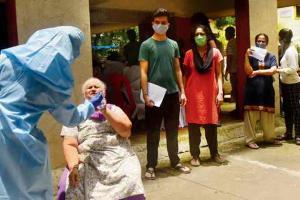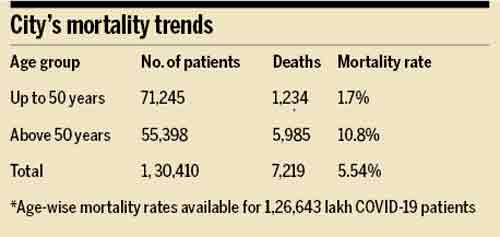A mortality rate of 10.8 in the highly vulnerable age group prompts the civic body to revise guidelines, no exceptions have been allowed

Health workers test residents of Mayekarwadi, Dadar West. Pic/ Suresh Karkera
In revised home isolation guideines, the BMC on Thursday made institutional quarantine mandatory for all aged above 50 years, citing a high mortality rate of 10.8 per cent in the age group. There will be no exceptions even for those without co-morbidities or symptoms. Homes and common passages in the building will be sanitised when a case detected.
ADVERTISEMENT
While the number of active cases is declining, the mortality rate remains high at 5 per cent. Till now, home isolation was recommended for those below 60 years without symptoms or with mild ones, without co-morbidities and having a separate toilet to themselves. "The mortality is very high for the age group of 50 to 60 years. The revised guidelines are based on the government of India's guidelines of July 2," said Dr Mangla Gomare, executive health officer of BMC. The mortality rate for those below 50 years is 1.7 per cent and for those above is 10.8 per cent. These people must get admitted to a Corona Care Centre 2 (CCC2).
Also Read: COVID-19: BMC chief cracks whip in key wards, Mumbai takes a step towards mass testing
Some of the wards have already started this practice. Vishvas Shankarvar, deputy municipal commissioner of Zone 7 (comprising Dahisar, Borivli, Kandivli) said that civic officials have insisted on early hospitalisation of senior citizens with even mild symptoms. The ward office in Borivli began insisting on institutional quarantine last week.
The downside
However, Dr Deepak Baid, president of the Association of Medical Consultants, said, "This order will create fear and all those above 50 will avoid being tested. Presently, the richer class is getting affected. They will end up going to corporate hospitals and reduce the number of available beds. The government should improve monitoring at home instead."
The BMC earlier used to sanitise people's residences and common areas in buildings, but the practice was suddenly stopped. The circular has emphasised on it again.
Resumption of sanitisation
"The sanitisation of affected areas wasn't stopped. But the decision was made at the ward level. Now as per the revised guidelines and Standard Operating Procedure, we will make sure that buildings where cases are reported get sanitised," said Anand Vaghralkar, joint municipal commissioner and in-charge of Solid Waste Management Department of the BMC.

Keep scrolling to read more news
Catch up on all the latest Mumbai news, crime news, current affairs, and a complete guide from food to things to do and events across Mumbai. Also download the new mid-day Android and iOS apps to get latest updates.
Mid-Day is now on Telegram. Click here to join our channel (@middayinfomedialtd) and stay updated with the latest news
 Subscribe today by clicking the link and stay updated with the latest news!" Click here!
Subscribe today by clicking the link and stay updated with the latest news!" Click here!






